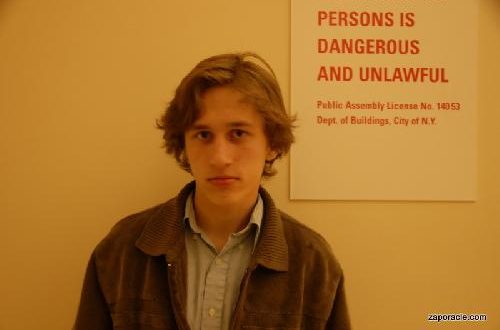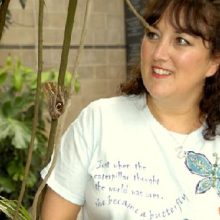WATCH THIS CARD AS A VIDEO: PART ONE PART TWO
When we think of the hazards of relationships, we tend to think of the hazards we perceive coming from others. Hurt feelings can cause us to neglect to notice the hazards we create for others. Relationships can be hazardous in both directions, but they are often well worth the risks.
We are the most dangerous known animal on the planet. For every person hurt by a wild animal, there are thousands who are hurt by members of their own species. Other people may misunderstand us, exploit us, and abuse us in a million ways, subtle and unsubtle. We should never ignore warning intuitions we have about particular people. There are many people, of course, we should stay as far from as possible.
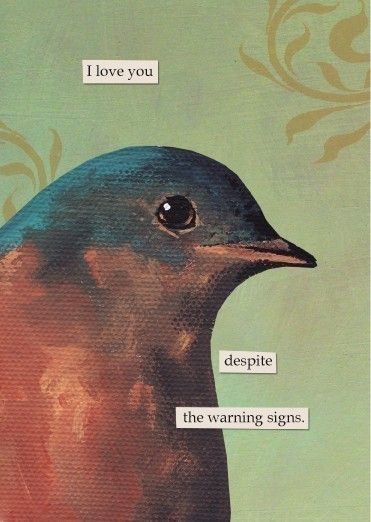
Image by Mincing Mocking Bird
On the other hand, we may also have an unfair and disproportionate view of the hazards of others. From the point of view of self-pity, we are innocent waifs trying to make our way in the world while we are being bullied and mistreated by a savage species. Sometimes, however, we have participated in the hazards created by others. We may set ourselves up for abuse by the other in all sorts of ways.
When hazards occur in consensual relationships, we should first look to ourselves to see how we may have cocreated the hazard, before our harsh gaze focuses on the other. It is an overwhelming human tendency to externalize the internal, and we would much prefer to find a hazard in the other than to see the hazards within ourselves. In other cases, the hazard may come mostly from the other, and in such cases we need to be careful about our boundaries.
It is relatively rare that we are in a position to evaluate the hazards of a relationship. It is especially dangerous to speculate about where the other is coming from, unless we are in a calm and compassionate state. The more agitated we are, the more likely we are to externalize the internal, to project, and to see the other as the hazard when we may actually have chosen them to personify a long-standing inner conflict.
Before accusing the other, see if you can get yourself into a calm and compassionate state and ask yourself the question: When have I been here before? When have I felt this way before? If you are honest with yourself, it is overwhelmingly likely that the answer will be: Many times, and with many different people. That’s your cue to question yourself and see how you may have contributed to setting up the recurrent situation. To paraphrase George Santayana, “Those who don’t learn from their relationship history are doomed to repeat it.”
When it comes to evaluating the hazards of relationships, no formula can take the place of case-specific, soul-searching discernment. Sometimes, the hazards aren’t worth it. As social mammals, we so easily get addicted to the buzz of the social matrix and default to being in company when we might more potently spend time in solitude. Often, the issue is not one of social versus solitude but of being more selectively social as compared to being open to any social experience regardless of quality. It is one thing to accept the inevitable hazards of soulful relationships and quite another to accept the hazards of being in a crowd of acquaintances.
We live in the age of the quick-fix approach. Self-help books will give you the ten steps to having fully functional, healthy relationships as though a one-size-fits-all formula could eliminate hazard from relationships.
There is no such formula, and even if there were, the hazardous aspects of relationships are often what make them developmental.
Discovering how easy it is for a misstep to result in you hurting the other, or the other hurting you, can create profound awakenings to compassion, empathy, and realizations of who you are and who the other is.
Every type of relationship carries potential hazards, but romantic relationships are the most classically associated with tragic magic. Narratives about love relationships in many cultures and times, are largely about hazard and high tragedy. Think of the stories about love in Greek mythology, think of Romeo and Juliet, or read a synopsis of any daytime soap. A love story without hazard is an unrealistic and boring love story.
If you are writing a screenplay about a romance, you must start by answering the question, “What is keeping them apart?” There must be an oppositional hazardous force — the two misunderstand or have trouble recognizing each other; their families, races, or nations are opposed; they are two but become three, and a painful triangle ensues; there are two, but the romantic longing is on one side only. Lovers may be separated by betrayal, misunderstanding, imprisonment, war, mental and physical illness, and death. Whether you look at love stories from Greek Mythology, the Bible, Shakespeare, or the latest offerings from Hollywood or Bollywood, you will always find their union opposed by classic hazards. Without oppositional elements, the human psyche does not evolve. Indeed, the soul may long for relationships with high tragic potential. As James Hillman says, “the soul pathologizes.” The soul may be searching for dark nights of the soul and may choose or be assigned relationships that will involve journeys into suffering and loss.
To have children is to multiply your personal hazard portfolio exponentially. If you’re unable to accept great hazards and concerns, don’t have children. Potential parents need to understand that they have no control of who comes across the birth portal. When you give birth, you are spinning the wheel of fate. For example, one percent of males and half a percent of females are psychopaths, and psychopathy is not explainable by parenting styles. Psychopathy appears to be a natural genetic variation, and some evolutionary biologists consider psychopaths to be a successful subspecies. Also, not all psychopaths are sociopathic. Some psychopaths even find socially useful ways to express their innate differences. A psychopathic child would still deserve parenting. So would many other types of children with qualities you did not choose or desire.
See my work on psychopathy: Foxes and Reptiles — Psychopathy and the Financial Meltdown of 2008-9
Your child could have a sexual orientation or identity you did not expect or want. Don’t expect your child to resemble you. Their talents, interests, relationships, and chosen vocations may have nothing to do with yours.
A foolish modern assumption is that children are born as blank slates and can be molded into idealized forms by “correct” parenting. Materialists assume children are the product of two factors- genetics and environment — but most cultures recognize a third factor — essence, which a soul carries into incarnation.
As you deepen a relationship, the hazards become more profound. The more you care about the other, the greater the potential hazards of loss, misunderstanding, and tragic conflict.To enter a relationship with someone is to accept being subject to fates not within your control.
Relationships can be destabilizing and create higher highs and lower lows. When two are deeply connected, the odds that at least one person will be in a bad mood multiply. Similarly, the odds that an accident or illness will befall at least one or that some unexpectedly good thing will happen to at least one multiply. If you are unwilling to accept hazards, don’t have romances or close friendships.
Sometimes, the other gives you stability; sometimes, the other takes it away. Depending on the situation, stabilizing and destabilizing aspects can be developmental. Too much stability could mean stagnation. Too much instability can demoralize you and break down your will to go on.
And yet, the greatest tragedy in many lives of this era is a lack of relationships. We are social animals, and we need relationships. Relationships are the primary source of meaning in most lives. In 2024, as I revise this card, one of the great social ills visible everywhere and in many grim statistics is that quality relationships are severely declining. Younger generations report fewer close friends, lovers, and even acquaintances. Smartphones and social media have caused a sharp decline in the social skills needed to form relationships. This decline in social bonds creates profound hazards for individuals and society.
A key thing to look for in prospective lovers, allies, and friends is level of commitment to consciousness. The present levels could be quite different, in which case the more evolved person will act as a mentor, but a compatible level of commitment is the most crucial variable to look for. Much depends on the willingness of the other to work through hazards in a life-affirming way, which is often a function of commitment to consciousness. In my experience, this commitment is an essential, innate, and irreducible factor we cannot supply for the other.
Another irreducible factor is where someone is on the benevolence to malevolence spectrum. Everyone has a shadow, and it’s unwise to commit yourself to a relationship if you cannot recognize and work with the other’s shadow. If you don’t see the other’s shadow, you are in a state of hazardous idealization. If the relationship continues, you will inevitably confront their shadow, and the idealization will likely crash into hazardous states of disillusion and disenchantment.
Accepting the hazards of relationships does not mean that we needlessly multiply them. There are many sorts of preventable hazards that arise carelessness, neglect or ignorance. We can lessen many relationship hazards by being more discerning about who we choose to enter a relationship with. Many hazards can be avoided by openness about expectations, agreements, promises, and boundaries at the outset.
No single oracle card can cover all the potential hazards and ways to deal with them, but there are two great principles to keep in mind. Following these two great principles will eliminate almost all needless hazards in relationships. Easier said than done. I don’t flawlessly follow these principles myself, but I work toward following them. Often that work requires moment-to-moment vigilance.
The First Principle: Inner Independence
Inner Independence means your center of gravity is the inner wholeness of your self. If your center of gravity is in the other person you have an inherently unstable structure that will be a hazard-making machine.
SEE THE ZAP ORACLE CARD INNER INDEPENDENCE
For more on the centrality of your relationship to yourself:
Casting Precious into the Cracks of Doom — Androgyny, Alchemy, Evolution and the One Ring
If romantic desires are compromising your inner independence read:
Lessons for an Entity Incarnating as a Mammal
See: Stop the Hottie!
Meeting Halfway
Meeting halfway is the touchstone of relationships. You don’t want to meet others less than halfway — shy retreat, neglect, etc — or meet them more than halfway — doing too much, compromising your dignity by pushing forward where unwelcome, giving unasked for advice, etc. The halfway point may shift moment by moment. A key skill in relating to others is to be, as Carol Anthony puts it (approximately), “attuned to the subtle minutiae of openings and closings in the other person, ready to advance or retreat at a moment’s notice.”
SEE THE ZAP ORACLE CARD MEETING HALFWAY
Later, on the day I revised this card in 2024, I recognized that most of my relationship hazards are caused by my inner adolescent self, who is often needy, vulnerable, and attention-seeking. He’s addicted to the high highs and low lows of creating emotional narratives about significant others and, if I fail to contain those tendencies, sets up dramas with others. My goal is not to kill off my inner adolescent, who is also a muse spurring my creativity, sense of adventure, and humor, but to encourage him to keep developing. I brought him forward in my imagination and we worked out a more ethical and functional set of compromises. I encouraged him to recognize these tendencies and he agreed they make him miserable. He also agreed that when we focus on our life mission rather than getting caught in dramas, we create fewer hazards in relationships, our friends like us better, and life feels like more of an adventure.
Consider this an auspicious time to accept the hazards of relationships while moving away from creating needless relationship hazards.
See: Confessions of a Self-Aware Starship
In the category section of Zap Oracle, choose the category: Eros: Love and Sexuality
This card abstracts the principles, to see them lived out and personified, read or listen to my sci-fi epic Parallel Journeys which involves hazardous relationships that must be accepted.
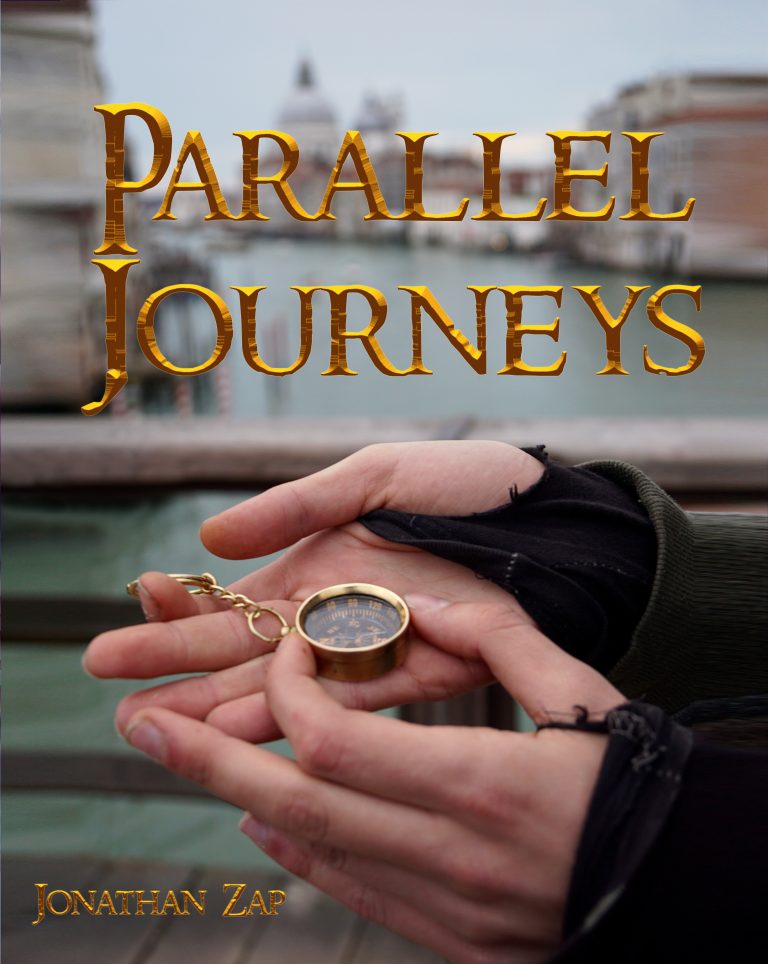
Opening premise:
Does this reality feel fundamentally wrong to you? What if the truths of what lies hidden are exposed in the journal of a survivor of an extinction-level event in our near future? His journals have been sent back in time to warn us about the perilous edge between extinction and evolutionary metamorphosis on which the fate of our species trembles.
The survivor writing to us is an empathic 18-year-old named Tommy. He’s been sealed in a three-acre biosphere with just one other person, and the outside world has been radio-silent for the three years of their enclosure. Tommy is in telepathic contact with someone living during our time who may hold the key to an evolutionary metamorphosis. The journals, entitled Parallel Journeys, have been sent back in time to inspire you to create your own metamorphic butterfly effects to help our species avoid extinction and survive in a new form.
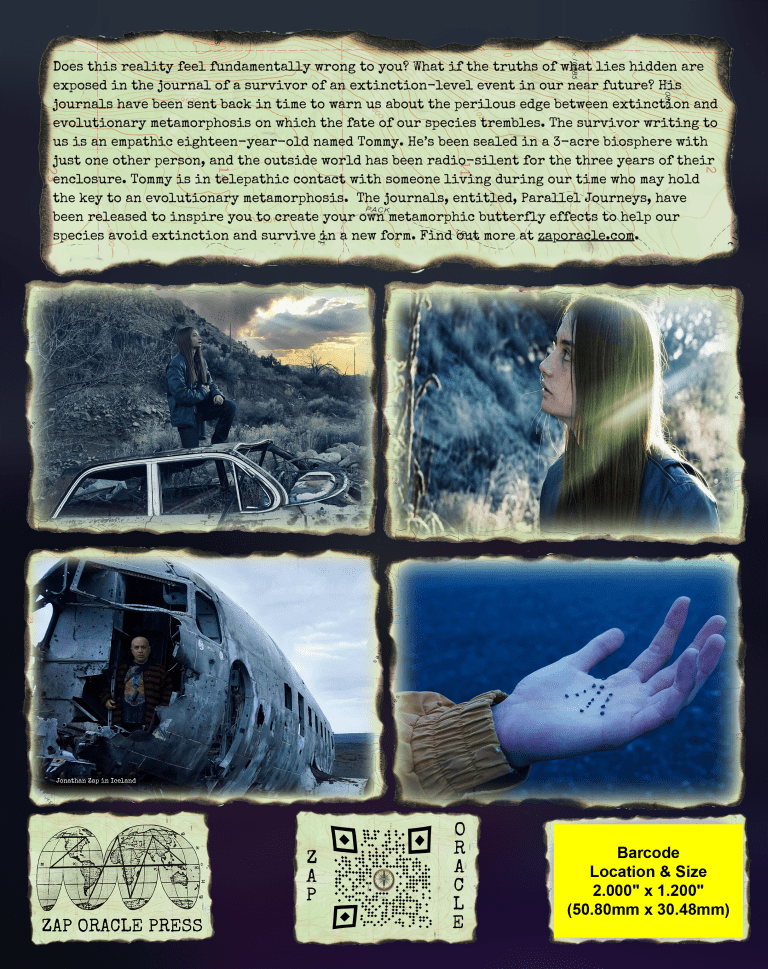
Parallel Journeys, can be read free on this site. If you prefer Audible, Kindle or physical versions, those are all available on Amazon.
 ZapOracle.com home to the free 720-card Zap Oracle
ZapOracle.com home to the free 720-card Zap Oracle

